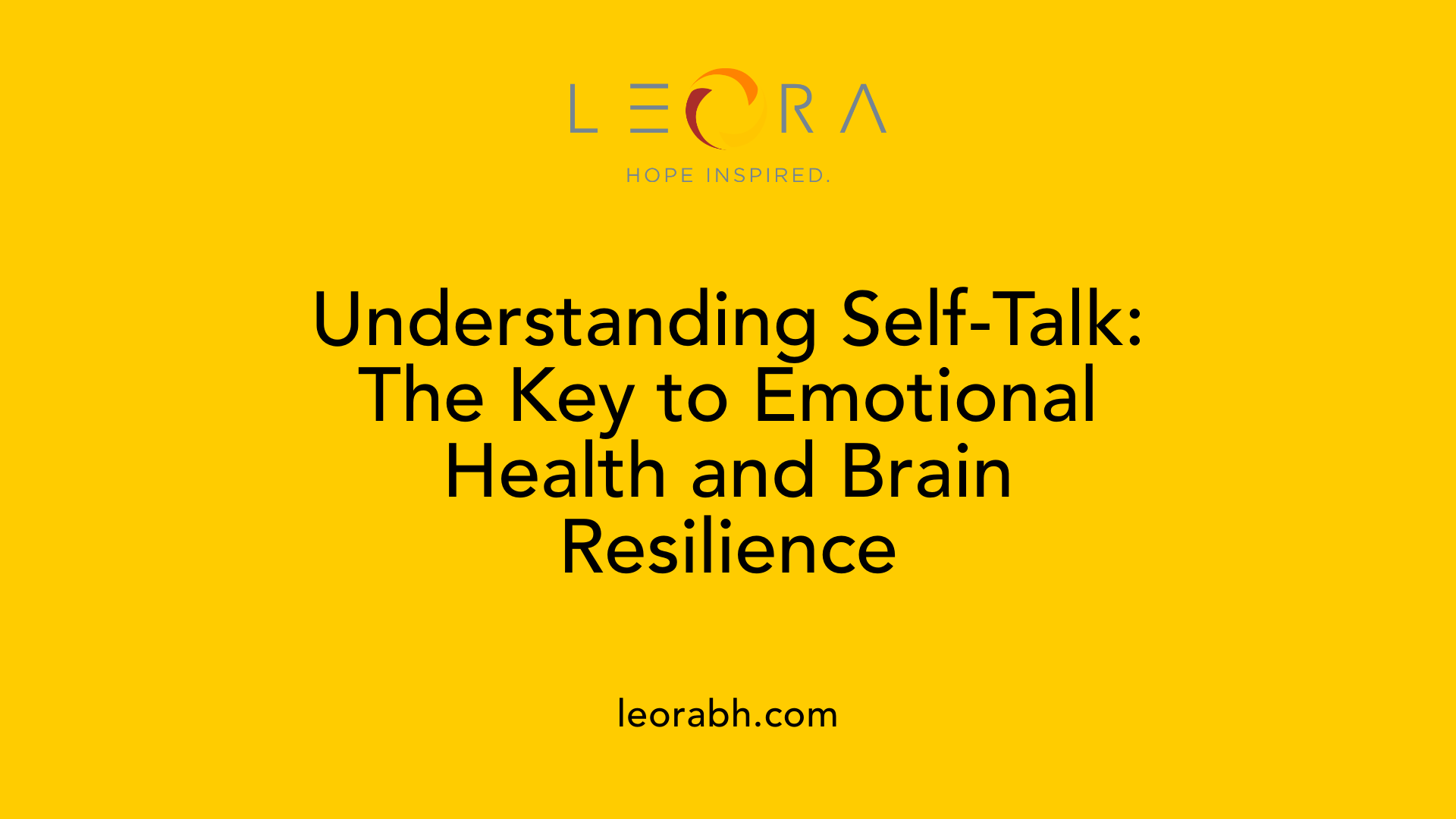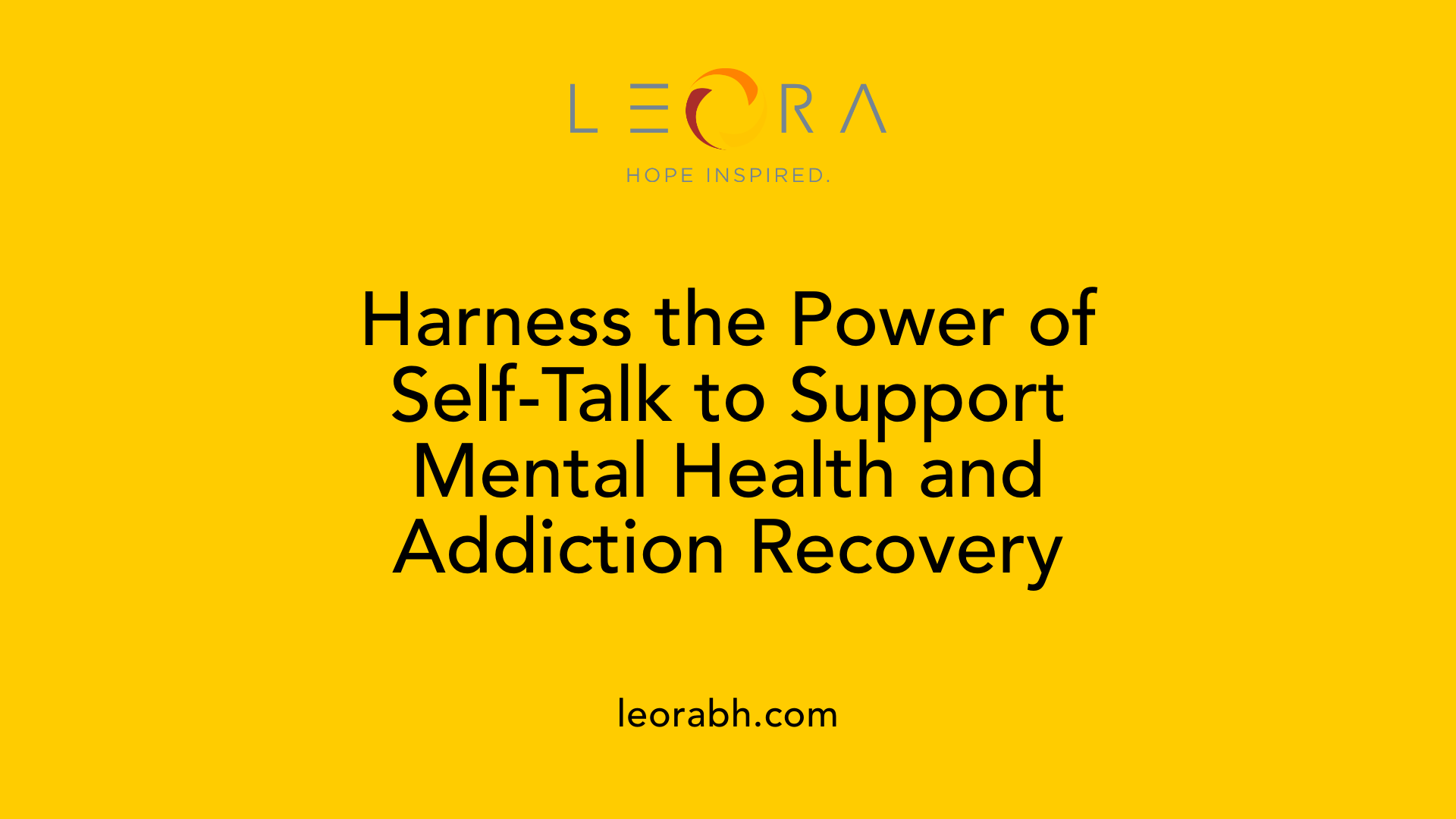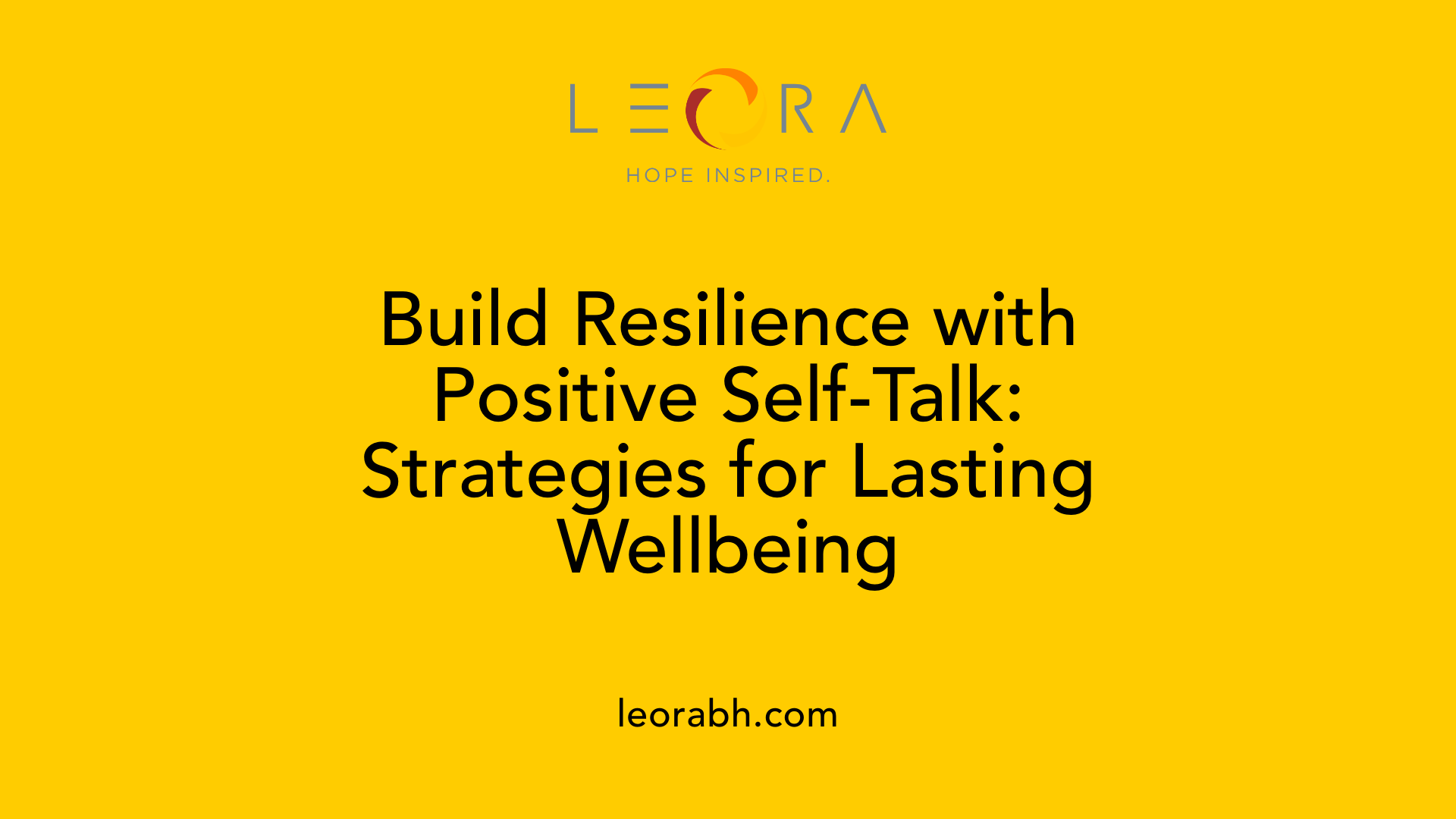How Self-Talk Affects Recovery and Mental Health
Harnessing the Power of Inner Dialogue for Improved Recovery and Well-Being
Understanding the Impact of Self-Talk on Mental Health and Recovery
Self-talk, the internal dialogue we have with ourselves, plays a crucial role in shaping our mental health and recovery journey. Positive self-talk nurtures resilience and motivation, while negative self-talk can hinder progress and deepen emotional struggles. This article explores how self-talk influences recovery processes, mental health, and relapse prevention, providing insights and practical techniques to foster healthier inner narratives.
The Foundations of Self-Talk and Its Influence on the Brain

What is self-talk?
Self-talk refers to the internal dialogue or perception we have of ourselves, which includes our thoughts, beliefs, and perceptions about life, our experiences, and our abilities. It can be positive, negative, or neutral and significantly impacts our emotional health. When practiced constructively, positive self-talk encourages a resilient and optimistic mindset, helping people cope effectively with life's challenges.
How positive and negative self-talk affect brain function
Positive self-talk enhances brain function by rewiring neural pathways that promote confidence, optimism, and resilience. This ongoing mental practice increases the production of neurotransmitters such as dopamine and serotonin, chemicals associated with improved mood and emotional regulation. Over time, these changes help individuals develop better coping skills, improve self-esteem, and resist stress.
Conversely, negative self-talk has detrimental effects. It activates brain regions linked to stress and emotional pain, leading to feelings of hopelessness, decreased self-worth, and shame. Repeated negative thoughts can entrench harmful mental health patterns, heightening the risk of depression and anxiety while impairing overall brain function.
What are the 3 C's of self-talk?
The 3 C's of self-talk are Catch, Check, and Change. This method involves first becoming aware of negative thoughts as they occur ('Catch'), then evaluating their validity and impact ('Check'), and finally replacing them with realistic, positive alternatives ('Change'). This process strengthens emotional regulation and mental resilience, especially among adolescents, and helps foster healthier thinking and self-esteem.
How does self-talk influence psychological mechanisms related to mental health and relapse prevention?
Self-talk deeply influences psychological processes that support mental health and recovery. Positive self-talk boosts an individual's belief in their abilities, promotes resilience, and encourages adaptive coping, making high-stress or high-risk situations more manageable. It reduces feelings of guilt and shame that often lead to relapse.
In contrast, negative self-talk can cause feelings of helplessness, contribute to the 'abstinence violation effect,' and increase emotional vulnerability, which heightens the risk of relapse. Cognitive-behavioral therapies often target maladaptive self-talk to enhance self-efficacy, emotional stability, and long-term recovery success.
| Aspect | Positive Self-Talk | Negative Self-Talk | Impact on Mood and Behavior |
|---|---|---|---|
| Brain Changes | Rewires neural connections; boosts dopamine, serotonin | Activates stress-related pathways | Enhances resilience; improves emotional regulation |
| Mental Health Effects | Builds confidence; fosters optimism | Creates hopelessness; increases depression risk | Influences likelihood of relapse in addiction recovery |
| Practical Strategies | Affirmations, reframing, mindfulness | Critical inner voice, catastrophizing | Supports mental stability and recovery outcomes |
Understanding and harnessing the power of self-talk can significantly influence brain health, emotional well-being, and resilience. Regular practice of positive self-talk—especially when combined with therapy, mindfulness, and other recovery tools—can promote a more adaptive brain response, contributing to sustained mental health and successful recovery from addiction.
How Positive and Negative Self-Talk Shape Recovery Outcomes

What is the role of positive and negative self-talk in mental health and addiction recovery?
Positive self-talk is vital in supporting mental health and addiction recovery. It involves nurturing thoughts and beliefs that boost feelings of well-being, confidence, and resilience. These encouraging messages help individuals better cope with stress, setbacks, and emotional upheavals. Techniques such as repeating affirmations, reframing challenging experiences, and focusing on positive aspects foster a healthier internal dialogue.
Research shows that positive self-talk rewires the brain by creating new neural pathways that promote confidence, hope, and perseverance. It can even elevate mood-enhancing chemicals like dopamine and serotonin, which support emotional stability. In addiction recovery, combining positive self-talk with therapies such as mindfulness, therapy, and support groups enhances resilience and can significantly improve treatment outcomes.
Conversely, negative self-talk can deepen mental health struggles by increasing stress, feelings of hopelessness, and self-doubt. It often manifests as persistent critical thoughts, catastrophizing, and pessimism. Such patterns can worsen mental health conditions, undermine recovery efforts, and create a cycle of hopelessness. Addressing these negative narratives through awareness, challenging distorted thoughts, and replacing them with supportive messages is essential for long-term recovery.
Why is it important to recognize and replace negative self-talk with constructive alternatives?
Identifying negative self-talk is the first step toward changing harmful thought patterns. Many people with mental health issues or substance use challenges tend to have recurring, critical inner voices that erode their self-esteem and motivation. Recognizing when these thoughts occur allows individuals to challenge and reframe them.
Replacing negativity with positive, constructive thoughts can help reduce symptoms of depression, anxiety, and low self-esteem. Techniques like practicing gratitude, embracing challenges, and focusing on solutions make these shifts possible. For example, replacing a thought like “I’ll never overcome this” with “I am capable of improving” fosters resilience.
Therapeutic approaches such as cognitive-behavioral therapy (CBT) are particularly effective in this process. They teach skills for recognizing cognitive distortions, developing healthier thought patterns, and cultivating self-compassion. Over time, these changes empower individuals to view themselves and their situations more realistically and kindly.
This transition from negative to positive self-talk supports emotional stability, boosts self-confidence, and fosters a mindset conducive to sustained recovery. It enables individuals to manage stress more effectively, build confidence, and stay committed to their healing journey.
| Aspect | Negative Self-Talk | Positive Self-Talk | How It Contributes to Recovery |
|---|---|---|---|
| Impact on Mood | Increases feelings of hopelessness and shame | Enhances optimism and resilience | Fosters emotional stability and motivation |
| Cognitive Pattern | Catastrophizing, black-and-white thinking | Reframing, affirmations | Builds self-esteem and realistic outlook |
| Effect on Brain Chemistry | Decreases neurotransmitters like serotonin | Increases mood-boosting chemicals | Supports brain health and emotional regulation |
| Recovery Influence | Can hinder progress and reinforce negative beliefs | Promotes perseverance and confidence | Enhances treatment outcomes and reduces relapse risk |
Understanding and employing positive self-talk is a powerful strategy for improving mental health, supporting addiction recovery, and cultivating a resilient and optimistic outlook for the future.
Practical Techniques for Cultivating Constructive Self-Talk
What are effective techniques for promoting healthy self-talk to support mental health?
Promoting positive and supportive inner dialogue is essential in enhancing mental health and recovery. One of the most effective methods is cognitive restructuring, which involves challenging and reframing negative thoughts into more realistic and optimistic perspectives. This technique helps reduce the harmful impact of negative self-talk that can lead to depression or anxiety.
In addition, mindfulness meditation plays a vital role. By practicing mindfulness, individuals learn to observe their thoughts non-judgmentally and cultivate a present-moment awareness. This awareness helps in recognizing patterns of negative self-talk early and allows for more conscious, constructive responses.
Using positive affirmations regularly can reinforce confidence and self-compassion. Simple statements such as 'I am capable' or 'I am worthy of love and respect' can gradually build a more positive self-image.
Surrounding oneself with supportive influences also contributes greatly. This includes engaging with uplifting content, supportive friends, or support groups that foster encouragement and understanding.
Identifying recurring negative self-talk patterns, such as catastrophizing or personalizing situations, enables targeted intervention. Once recognized, these patterns can be challenged by questioning their validity and replacing them with balanced, constructive thoughts.
Incorporating self-care, practicing gratitude, and viewing setbacks as opportunities for growth further strengthen resilience and foster self-compassion. Activities that promote well-being should be part of a daily routine to build a habit of positive self-talk, ultimately supporting mental health and aiding in recovery.
Building Resilience and Long-Term Wellbeing Through Self-Talk

How does positive self-talk support resilience?
Positive self-talk helps build resilience by rewiring the brain to develop new neural connections. This process promotes confidence, optimism, perseverance, and emotional stability. When individuals consistently practice uplifting thoughts, they tend to respond to challenges more effectively, viewing obstacles as opportunities to grow.
What are the benefits of a growth mindset and self-compassion?
Adopting a growth mindset—believing that abilities can develop through effort—can be reinforced through positive self-talk. It encourages individuals to see setbacks as part of the learning process. Coupled with self-compassion, which involves being kind to oneself during failures, positive self-talk fosters a nurturing attitude toward personal growth.
How does positive self-talk affect emotional stability?
Regularly engaging in positive self-talk, such as repeating affirmations and focusing on strengths, increases the production of mood-enhancing neurotransmitters like dopamine and serotonin. This leads to better emotion regulation and a more stable mental state, reducing feelings of hopelessness, shame, and negativity.
The long-term benefits of positive self-talk for mental health
Research suggests that cultivating a positive inner dialogue can extend the benefits of improved mental health over time. It can lower stress levels, decrease symptoms of depression and anxiety, and increase overall satisfaction with life. For example, studies involving older women indicate that optimism related to positive self-talk can help prolong life. To achieve these benefits, integrating self-talk strategies into daily routines, along with therapy and other recovery tools, can be especially effective.
| Benefit | Impact | Supporting Details |
|---|---|---|
| Increased self-esteem | Improved confidence in abilities | Repeating affirmations and listing strengths helps reinforce a positive self-image |
| Better emotional regulation | Reduced mood swings and stress | Neurotransmitter boosts contribute to better mood and resilience |
| Greater motivation | Persistence through difficulties | Focusing on solutions and growth fosters perseverance |
| Enhanced recovery from mental health issues | Long-term mental stability | Combining positive self-talk with therapies like CBT supports sustained recovery |
Building a habit of encouraging, realistic self-talk tailored toward solutions and growth not only boosts mental health but also strengthens resilience, enabling individuals to face life's ups and downs with a positive outlook and emotional stability.
Empowering Recovery Through Mindful Inner Dialogue
Harnessing the power of positive self-talk is essential in supporting mental health and recovery processes. By recognizing negative thought patterns and replacing them with constructive, compassionate narratives, individuals can foster resilience, improve emotional regulation, and enhance their overall well-being. Techniques such as mindfulness, affirmations, and cognitive restructuring serve as valuable tools in cultivating a growth mindset and long-term mental stability. Ultimately, nurturing a supportive inner dialogue not only facilitates recovery from addiction and mental health challenges but also empowers individuals to face life's hardships with confidence, hope, and resilience.
References
- What Is Positive Self-Talk and How Does It Impact Recovery?
- Why Positive Self-Talk is Essential in Addiction Recovery
- Are You Talking Yourself Right into Addiction? - The Recovery Village
- Positive Self-Talk In Recovery From Addiction - GIA Miami
- Overcoming Negative Self-Talk Toward a Better Life | FHE Health
- What Is Positive Self-Talk and How Does It Impact Recovery?
- The Power of Self-Talk in Our Self-Care Practices • Spectrum Health
Find Your Inner Light
Related Articles
Schedule an Assessment
Leora Behavioral Health provides comprehensive treatment services, including ambulatory detox, mental health IOP, and SUD IOP, to support your journey toward lasting recovery.
Our caring team will guide you through the admissions process and create a personalized treatment plan tailored to your unique needs. We welcome walk-ins. If you or a loved one is struggling, reach out today. We’re here to help.


.svg)




.svg)
.svg)
.svg)
.svg)
